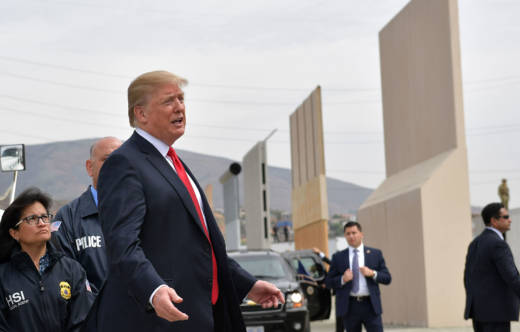President Trump often calls for the Senate to eliminate the filibuster, the body's rule that requires a 60-vote majority for most legislation to pass in the Senate. Trump sees the filibuster as the only thing preventing Congress from passing many of his most partisan priorities like funding a wall along the U.S. border with Mexico or repealing the Affordable Care Act. But there are two main problems with that thinking: Many of Trump's most controversial proposals couldn't pass in a filibuster-free Senate and most senators aren't interested in ditching the higher bar for legislation.
The Senate already voted on a White House-approved immigration plan earlier this year — and it failed 39-60 — far short of a simple majority. The proposal was among the options considered during a lengthy immigration debate in February.
The effort to repeal the Affordable Care Act failed to meet a similar bar in that late-night vote where Sen. John McCain, R-Ariz, killed the bill with a simple thumbs-down. That night, 51 senators voted against the ACA repeal process, 49 approved, effectively killing that bill.
The filibuster is a popular scapegoat when the legislative progress grinds to a halt in Congress. Presidents and frustrated lawmakers lambast the rule as an excessive burden to passing widely supported legislation. But it is also one of the signature features of the slower, more deliberative Senate.
Senate leaders have scaled back the filibuster a few times in the past -- most notably in 2013 when former Senate Majority Leader Harry Reid, D-Nev., triggered what is known as the nuclear option to overcome a backlog of President Obama's picks for executive offices and judgeships.
Reid eliminated the filibuster for those positions, sparking a new precedent that federal judicial appointments and many executive office nominees can be approved with a simple majority. That's still the case today.
Senate Majority Leader Mitch McConnell, R-Ky., had a nuclear moment of his own last year when he extended that simple majority threshold to Supreme Court nominee Neil Gorsuch.
But McConnnell says he doesn't support getting rid of the filibuster entirely. He refused to take the drastic step of getting rid of the protection to end a government shutdown earlier this year.
The legislative filibuster has wide support among Senators who view it as an important way to protect the rights of the minority party to force debate on controversial issues. The higher bar forces a broader consensus on legislation, which can help prevent Congress from passing new, more partisan laws every time a new Congress is elected.
— Kelsey Snell, Congressional Reporter
Claim 6: Democrats killed DACA

9(MDAxOTAwOTE4MDEyMTkxMDAzNjczZDljZA004))
